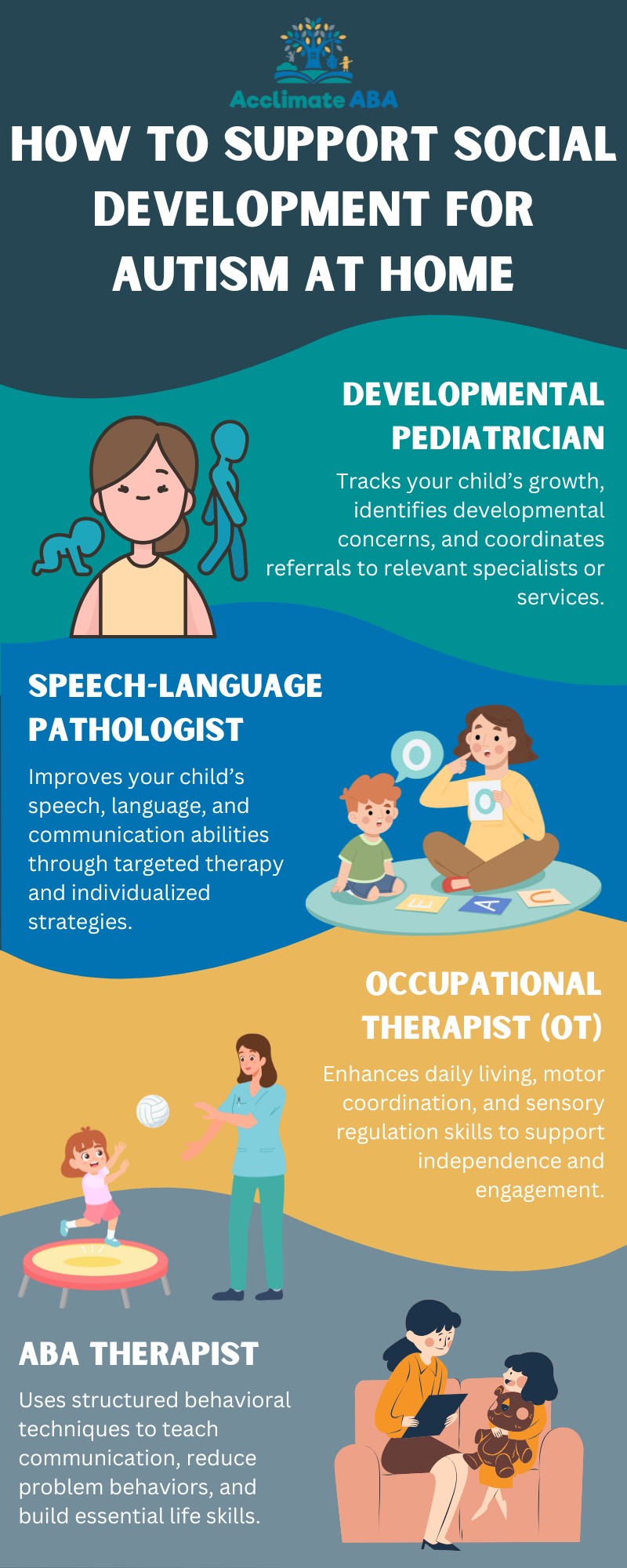Key Points:
- Early steps after an autism diagnosis can significantly impact long-term outcomes.
- Emotional support, educational planning, and therapeutic interventions are critical in the first stages.
- Parents should build a care team, research treatment options, and create structure at home.
A new autism diagnosis can feel overwhelming, but taking the right steps early on can make a lasting difference. According to research, greater gains in language and adaptive behavior can be achieved when intervention begins as early as 2 to 3 years old. This highlights just how powerful those first actions can be.
From building a care team to learning about therapies and educational support, families have a critical opportunity to create a foundation for growth. In this guide, we’ll walk you through what to do next, how to find support, and how to advocate for your child’s future.
What to Do After an Autism Diagnosis?
After an autism diagnosis, it is important to seek early intervention services, gather a support team, and educate yourself on autism spectrum disorder. This will help build a solid foundation for your child’s development and long-term success.
Understanding the diagnosis is just the first step. Families often ask where to begin, who to talk to, and what actions can truly help their child thrive. Taking timely and informed steps can shape a path toward effective support.
How Should Parents Emotionally Process the Diagnosis?
The emotional weight of a diagnosis can affect parents deeply. Processing the news takes time, and it’s common to feel sadness, guilt, confusion, or even relief. These feelings are valid and expected.
It helps to talk to a trusted therapist, a support group, or other parents who have been through similar experiences. Sharing feelings in a safe space prevents emotional burnout and helps you remain present for your child. Self-care isn’t selfish—it’s essential.
Who Should Be on Your Child’s Support Team?
A multidisciplinary team can provide holistic care for your child. Each professional plays a specific role in identifying your child’s needs and helping you address them. Key members of your child’s care team might include the following:

Having open communication among these professionals ensures a more consistent and collaborative approach to care.
Why Is Early Intervention So Important?
Early intervention is essential because the brain is most adaptable during the first few years of life. Starting therapies like ABA, speech, or occupational therapy during this period can lead to significant improvements in communication, social interaction, and behavior.
It also gives families the tools and support needed to guide their child’s development. Early services can reduce frustration, promote independence, and increase school readiness. Children who receive early intervention have better long-term outcomes, making it one of the most impactful steps families can take after an autism diagnosis.
What Therapies and Treatments Should You Consider?
Choosing the right therapy depends on your child’s specific strengths and challenges. No one-size-fits-all treatment exists, but evidence-based options are a good place to begin. Below are common autism interventions:
1. Applied Behavior Analysis (ABA)
ABA uses positive reinforcement to teach new skills and reduce challenging behaviors. It’s highly individualized and often focuses on communication, social skills, and daily routines for children with autism.
2. Speech Therapy
Speech therapy supports both verbal and non-verbal communication. Therapists help children improve articulation, language comprehension, social communication, and use of augmentative tools like PECS or speech-generating devices when needed.
3. Occupational Therapy
OT helps children build independence by addressing motor coordination, sensory processing, and daily living skills. It also supports emotional regulation and attention through structured, play-based activities tailored to each child’s needs.
4. Feeding Therapy
Feeding therapy helps children with restricted diets or oral motor challenges. It addresses food aversions, chewing and swallowing difficulties, and promotes positive mealtime routines in a gradual, supportive way.
5. Social Skills Training
This therapy focuses on helping children navigate peer interactions, understand social cues, and build relationships. It often uses role-playing, group sessions, or structured play to support practical, real-world application.
Families may also explore complementary methods such as music therapy, but core therapies should remain evidence-based.
How Can You Learn More About Autism?
Learning more about autism starts with accessing reliable, evidence-based resources. Reputable organizations like the CDC, Autism Speaks, and local autism centers provide educational materials, toolkits, and developmental milestone checklists. Books by professionals, podcasts, and online courses can also offer practical insights for parents.
Support groups, workshops, and webinars allow families to connect with others and learn from shared experiences. Following certified therapists or autism specialists online can help you stay up to date on strategies and services. The more informed you are, the better equipped you’ll be to advocate for your child and support their development with confidence.
How Do You Work With Schools and Educational Services?
Working with schools starts by requesting an evaluation for services through an IFSP (under age 3) or IEP (age 3 and up). These plans outline personalized goals, supports, and accommodations based on your child’s unique needs.
Attend meetings prepared with notes, questions, and examples of your child’s strengths and challenges. Collaborate with teachers, therapists, and administrators to build a supportive educational plan. Regular check-ins and open communication help ensure consistency between home and school.
Being involved and informed allows you to advocate effectively and helps your child succeed both academically and socially in their learning environment.
What Should Parents Avoid Right After Diagnosis?
Well-meaning parents often rush into multiple treatments, try unproven therapies, or compare their child to others. It’s important to remain focused, intentional, and informed. Below are the common pitfalls to avoid:
1. Avoid Starting Too Many Therapies
Beginning several therapies at once can overwhelm both you and your child. Prioritize based on need, and gradually introduce treatments to ensure effectiveness and avoid emotional or financial burnout.
2. Be Cautious of Miracle Claims
Not all treatments promoted online are safe or effective. Stick to evidence-based approaches and consult trusted professionals before trying new therapies or products that promise rapid or miraculous results.
3. Don’t Compare Your Child’s Progress
Every autistic child develops at their own pace. Comparing your child to others may lead to unnecessary stress and overlook the meaningful, unique progress they are making.
4. Don’t Blame Yourself
Autism is not caused by parenting. Blaming yourself can delay healing and acceptance. Focus on being present and proactive in supporting your child’s needs without guilt.
5. Don’t Ignore Your Own Needs
Caring for your emotional well-being is essential. Seek support, rest when needed, and connect with others. A healthy, supported parent is better equipped to support their child effectively.
Stick with evidence-based support and work with qualified professionals. Progress is not linear, and celebrating small gains helps maintain a positive outlook.
Support Everyday Success With ABA Therapy
If you’re wondering where to begin after your child’s diagnosis, ABA therapy can be a cornerstone of their developmental journey. At Acclimate ABA, we provide individualized ABA therapy in Utah to support communication, reduce problem behaviors, and build essential life skills.
Get in touch with us to learn how we can help you create a plan tailored to your child’s needs. We’re here to guide you every step of the way.



